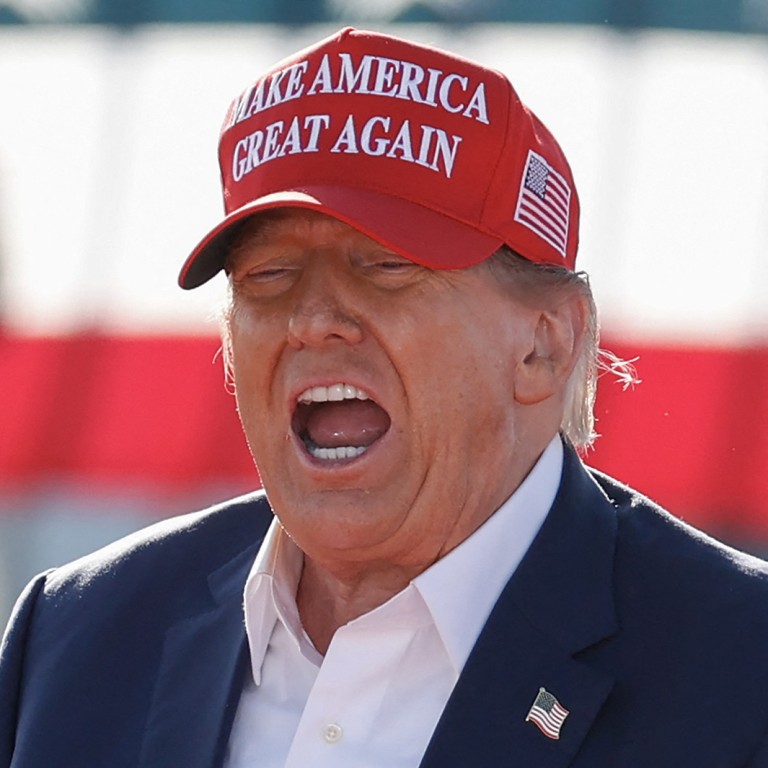
EU united in unease over possible Trump win, but few agree on future path
- Former American leader’s vows to slap 10 per cent universal tariff and cease funding Ukraine war effort has sent shock waves across continent
- China could be one area in which the US and EU could continue working together, owing to ‘common concerns’
“With Trump, there will be no respect of international rules any more, a 10 per cent tariff on everything, using trade as a weapon and so on,” said Bernd Lange, the head of the European Parliament’s trade committee, during a media briefing on Tuesday.
When Trump was president, Lang said he had to engineer clandestine meetings with officials from the Office of the US Trade Representative (USTR) because they were not permitted to meet with their supposed transatlantic allies.
“It was forbidden for people from USTR to speak to me, so we had to organise some hidden meetings in Washington,” recalled the veteran German lawmaker. “For years, nobody knew their telephone numbers at USTR – this should be avoided, even under Trump.”
EU passes recycling and rights laws that may sharply affect trade with China
Across town, senior officials confirmed on Tuesday that the EU was contingency planning for various geopolitical scenarios.
“We have no idea what is going to happen in 2025. We’re preparing various scenarios, but I’m not going to tell you what we are cooking,” the EU’s deputy director general for trade, Leopoldo Rubinacci, told an event organised by the American Chamber of Commerce.
At the event, attended by scores of American business executives, Trump was the elephant in the room. Speakers appeared reluctant to name the ex-president, let alone discuss the pressure his re-election would exert on transatlantic ties.
In a sign of the trauma plaguing much of Brussels since Trump’s first term, Rubinacci appealed for American businesses’ help to ensure the bilateral relationship would survive another four years, without naming the former president directly.
China could be one area in which the parties could continue working together, owing to “common concerns”, Rubinacci added.

“If you believe in this relationship, you really have to continue arguing in favour of it, because this is the only way by which this relationship is going to continue and it’s going to be not too affected by a number of political decisions that may or may not be made in the future,” he said.
Under the Biden administration, transatlantic relations have improved. The two sides have collaborated deeply on economic sanctions and export controls relating to Russia’s invasion of Ukraine.
A Transatlantic Trade and Technology Council (TCC), established early in Biden’s term, has seen the pair test the water on coordinating certain areas of China-facing policy, but the results have been mostly underwhelming.
“There are certainly various ways the EU was hoping for more tangible progress over the past years,” EU trade chief Valdis Dombrovskis told the event on Tuesday.
“A prime example is the steel sector and the US [Section] 232 tariffs. We regret that we did not manage to reach an agreement in spite of very hard work and constructive proposals.”
EU fails to pass supply chain law that would require audits on Chinese firms
With Trump promising to renew economic tensions with Europe and go even harder on China in a second term, there has been scepticism about whether the TTC format – the next meeting of which is in Belgium in April – will survive.
Republican congressman Nathaniel Moran of Texas believed the sides must try to target areas that have “bipartisan support in the United States”, one of which is China.
“It doesn’t really matter about the elections if we treat the TTC correctly … if you can just imagine a Venn diagram find those areas of consensus that Europe agrees with … then both Republicans and Democrats agree with,” Moran said.
Observers have voiced doubt as to whether the EU should earn Trump’s approval by proving its hawkishness on Beijing, as suggested by Swedish Prime Minister Ulf Kristersson in an interview with Politico last week.
As Europe reels from Trump threat, Ukraine and Middle East, Wang heads to Munich
“I don’t think Europe would gain in trying to please Trump, if it means contradicting its own interest and policies,” said Pierre Emmanuel Noel, a diplomatic adviser to the Belgian government.
“If Trump is what the American people want, we’ll have another four years trying to converge as much as possible.”
Speaking to the Post on the sidelines of the business event, Slovenian Foreign Minister Tanja Fajon confirmed she would visit China in two weeks and suggested Europe would continue to work with Beijing no matter who is elected in Washington.
“But on the other hand, we have to also see the global trends and China is a rising economy, and we need to work together in addressing global challenges. Of course, there is a systemic rivalry between the US and China, but we have to find a way how to do big challenges together.”

